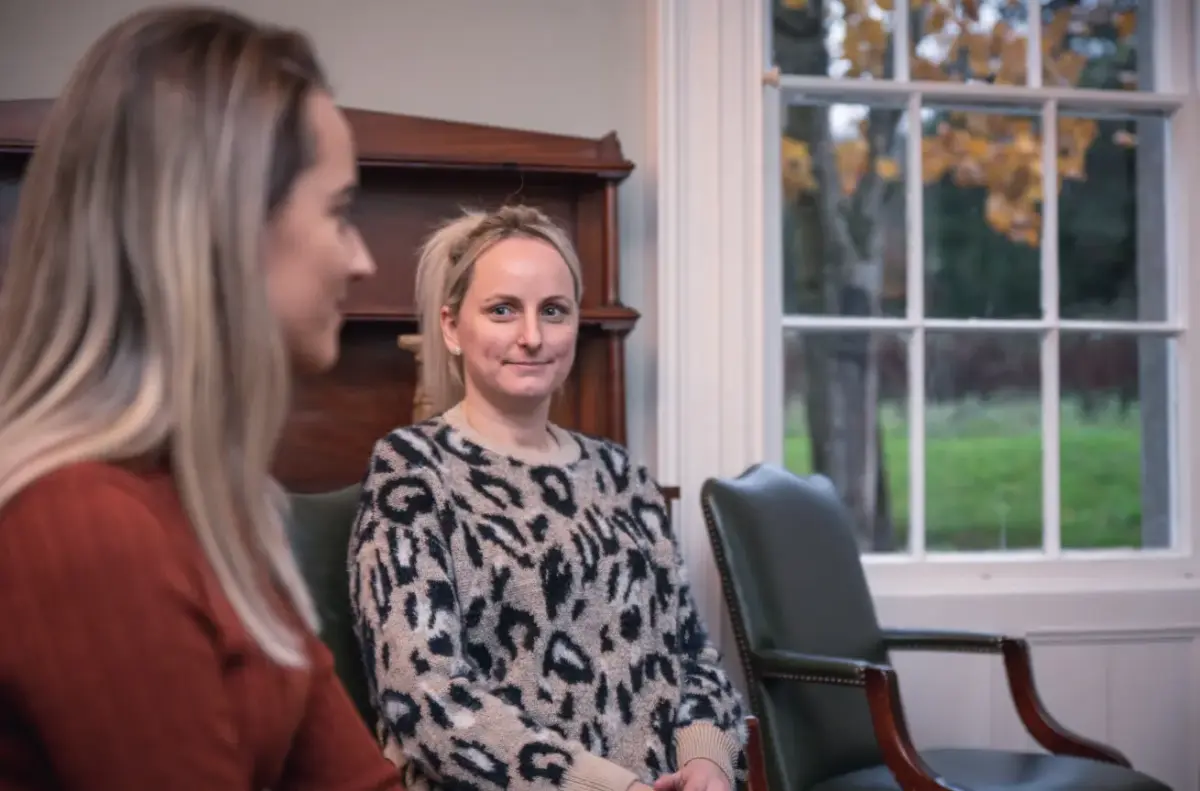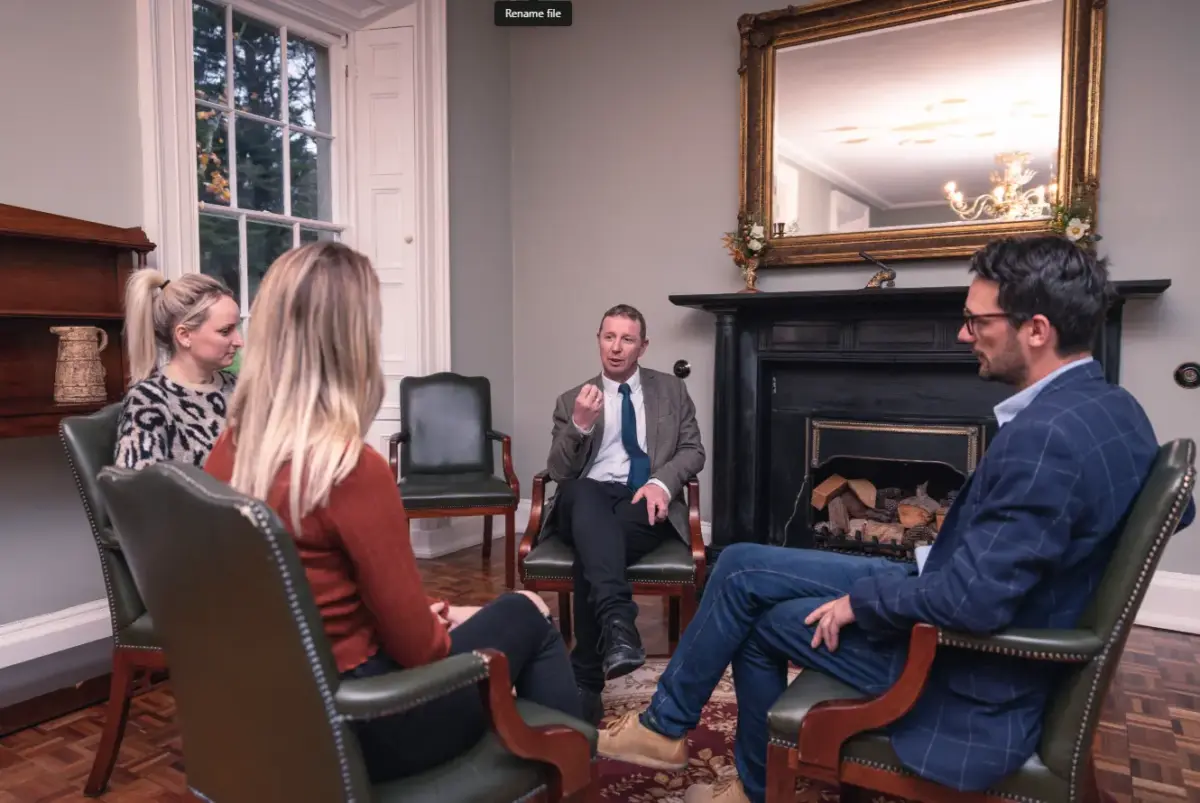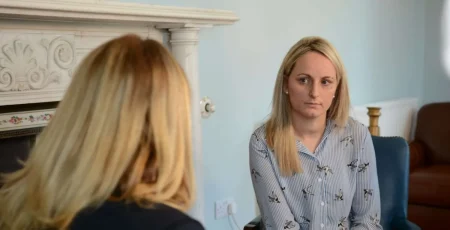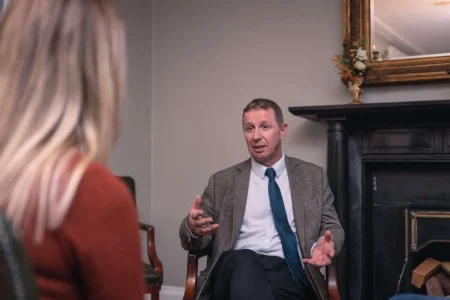When someone you love is struggling with some form of addiction – alcohol, another substance use disorder, or some other behaviour such as gambling, it can be hard to know the best course of action, especially if they are themselves in denial about the situation. Family members and friends, too, can sometimes be in denial about a loved one’s addiction. Staging an intervention can seem a drastic course to take, but if properly planned, it can be the moment when recovery begins.
What Is an Intervention and When Is It Needed?
A successful intervention is a planned, face-to-face meeting where family, friends, and sometimes professionals, come together as an ‘intervention team’ to express concern for someone who is harming themselves through substance misuse or some other addictive behaviour. It is not an ambush, an argument, or a guilt trip. At its heart, an intervention is an act of love: a way to say, “We see the damage, we know you can get better, and we’re ready to help you take the first step.”
A successful intervention:
- Clearly describes the impact of the person’s addiction on themselves, friends and others
- Presents a firm but compassionate invitation to accept professional help
- Sets boundaries if the loved one refuses help
- Is conducted at a time when the individual is (ideally) sober and not under the influence
The goal is not to punish or shame but to break through denial and offer a path towards recovery, typically through immediate admission into a structured treatment programme.

Download our Brochure
What are the signs that your loved one may need an intervention?
There is no perfect moment to persuade an addicted person to accept treatment. People often procrastinate until a crisis happens: an overdose, an arrest, a lost job, before finally taking action. This may seem like a moment of pain in a loved one’s life, but it is actually for many, the start of their recovery journey.
Remember that addiction is progressive, and waiting for things to get worse is never a good strategy.
Some signs that it may be time for staging an intervention include:
- Ongoing denial or downplaying of substance use
- Repeated failed promises to stop or cut back
- Financial or legal troubles related to drinking or drug use
- Strained or broken relationships
- Declining mental or physical health
- Frequent emotional volatility or aggression, and loss of control
Remember, your person of concern doesn’t have to “hit rock bottom” to benefit from treatment. An intervention can be the catalyst that brings them to the realisation that they need help, before more damage is done.
Where a person is struggling with denial of their condition or its severity, care is needed to bring the right approach, since a confrontational attitude can have negative effects.

Types of Interventions: Which Is Right for Your Situation?
There is no standard structure for staging an intervention; each situation is different, and factors such as a person’s age, the type of addiction and family dynamics generally all play a part. However, there is no denying that interventions are stressful and require careful planning, so professional help of some kind is usually advisable. There are three recognised approaches, of which the first is the most commonly used:
-
Classic/Johnson Model:
This is the most well-known and structured form of intervention (Dr Vernon Johnson was a notable intervention pioneer in the 1970s.)
- Family and friends, often guided by a trained interventionist, plan and rehearse a surprise confrontation.
- During the intervention, they express concern and love, present specific examples of harmful behaviours, and offer a pre-arranged treatment path.
- The goal is to break through denial and motivate their loved one to accept help immediately.
-
Invitational Model
This approach is non-confrontational and transparent.
- The addicted person is invited to attend a meeting or workshop with their family.
- The focus is on open dialogue, education, and support rather than pressure.
- Over time, with repeated sessions if needed, the loved one is encouraged to voluntarily enter treatment.
-
Family Systemic Model
This model views addiction as a symptom of broader family dynamics.
- The intervention involves the whole family in addressing unhealthy patterns and behaviours.
Who Should Carry Out the Intervention?
The Intervention Team – Who Should Be Involved?
The most effective interventions involve 4–6 people who are meaningful to the person struggling, people they may love, rely on, or respect. This could include spouse, parents, siblings, close friends, or work colleagues. If appropriate, a GP, a mental health counsellor, a therapist or some other healthcare professional support may also be included.
Important points to consider:
- Everyone must be willing to prepare and stick to the plan.
- Emotional stability – remain calm – a loving tone is essential, whatever individual feelings are aroused..
- Individuals who are also struggling with untreated addiction or mental illness should not participate.
In many cases, working with a professional therapist experienced in staging an intervention can make a significant difference. An experienced professional trained in interventionist techniques helps keep the meeting on track, defuses conflict, and ensures that strong feelings don’t confuse the message. They can also help prepare the group, offer support, assess risk, and navigate what comes next.
Addiction Interventions
Learn more about addiction interventions at Smarmore Castle.
How to Prepare for Staging an Intervention
Here Is a Step-by-Step Guide to Staging an Intervention
-
1. Consult with a Professional
Careful planning is essential so, before doing anything, speak to an addiction counsellor, social worker, or your GP. They can help you understand the risks and the negative effects, and advise on the process, and recommend suitable treatment options. They may also help you decide whether a residential programme is advisable (in many cases, it is).
At Smarmore Castle, we are always happy to help you find the best options so don’t hesitate to give us a call.
-
2. Form the Intervention Team
Select the best possible group of committed individuals. This will probably include family, a friend and a professional of some kind. The people involved should agree to work together, rehearse what they plan to say, and support the ultimate goal: getting the addicted person into treatment.
Avoid including people who are likely to become confrontational, emotional, or stray off message. Do not include anyone showing signs of addictive behaviour either.
-
3. Gather Information and Prepare Treatment Arrangements
This is not the time to “see what happens.” In advance of the intervention itself, a list of treatment options should be drawn up and discussed, having regard to suitability – cost, availability and location are examples of factors to consider and the most likely sources of treatment should be contacted and possible arrangements discussed.
For example, if residential treatment is recommended, the goal should be to have a treatment bed ready, preferably in a residential 12-step facility or some other provider of addiction services, and logistics sorted (transport, suitcase, medical details, etc.). Speak with the treatment provider in advance to secure admission, ideally for the same day as the intervention.
-
4. Rehearse What Each Person Will Say
All intervention group members, including intervention professionals present, should write down what they want to say during the intervention to the person suffering the addiction. These statements should:
-
- Be written in the first person (e.g. “I feel…”, “I have seen…”)
-
- Include specific examples of how the addiction has affected them
-
- End with a clear call to action (i.e. “Please accept the treatment we’ve arranged” or “now is the time to seek support”.)
Avoid accusations, name-calling, or ultimatums that can’t be enforced. Stay focused on facts and feelings, not judgment. Stage a rehearsal intervention, testing what to say and how to say it (non-judgmental, clear, compassionate).
-
-
5. Prepare for different reactions (anger, denial, refusal).
The moment of intervention may well come as a shock to the addicted person, and their reaction might well be one of anger or outright denial. It is important for participants to anticipate, discuss and rehearse possible reactions and talk through how to deal with them. Be ready for an outright refusal and have a response ready but be sure to respond calmly and lovingly, whatever you may be feeling.
A negative reaction to the idea of treatment is a time to make clear certain boundaries and consequences: “I will not continue to enable your drinking by making excuses for you” or “I will not continue to finance your gambling habit.”
-
6. Action Following Intervention Outcome
There should be a clear action plan ready to implement, whatever outcome is achieved. If the desired goal of agreeing to seek treatment is reached, then that should be made to happen without delay. On the other hand, if refusal or some other outcome results, then new boundaries or other arrangements should be demonstrated without delay, always taking care to avoid further harm.
Choosing the Right Treatment Pathway – Outpatient Day-Care or Residential Treatment Centre?
When considering the right treatment type to be proposed at an intervention meeting, it is important to match the type and level of care to the complexity of a person’s actual disorder. This is especially so where trauma or some other mental health conditions are present, or when the diagnosis points to a concurrence of addictive behaviours.
Inpatient versus Outpatient Treatment
Overcoming addiction can happen in many forms, and some people can achieve sobriety simply through regular attendance at self-help fellowships such as Alcoholics Anonymous. Others may respond well to a structured programme of outpatient attendance at regular group and individual counselling sessions.
However, many people who struggle with addiction and its consequences find that societal and other pressures are so overwhelming that their best option is to remove themselves for a while to a safe place, where they can concentrate on personal change, while receiving professional guidance and proper medical and psychiatric care.
When the situation at home has become so serious that a managed intervention is deemed necessary, then it is probable that a structured residential treatment provider is going to offer the best possible chance of success.
Why Residential 12 Step Treatment Works
12-step-based residential rehab programmes are more than just a place to dry out. They offer a total reset. Through intensive counselling, group support, and spiritual reflection, individuals are helped to:
- Take personal responsibility for change
- Understand the nature of addiction and themselves
- Begin making amends and building a new life
- Connect with others who understand their struggle
- Learn how to live without substances by acquiring healthy habits, one day at a time.
In Ireland, several respected treatment centres are founded on the 12 Step model, and they offer long-standing success. These centres offer not only detox and rehabilitation but ongoing aftercare, family involvement, and peer networks for life beyond treatment.
Smarmore Castle has been offering these services since 2015, providing a safe environment for patients to detox in a medically supervised facility, undergo a wide range of therapy options including cognitive behavioural therapy (CBT), and access a structured aftercare programme to help support individuals throughout their recovery journey.
Contact a member of our team today to find out more about addiction treatment services.

What Happens During a Successful Intervention?
There should be no aggression when staging an intervention. Choose a private, quiet space with no distractions. Do not inform your loved one of the purpose of the intervention in advance—only that they need to attend an important family meeting.
In a typical intervention, there will be a facilitator who takes control, introduces and concludes the meeting and sets time limits on speakers if necessary – someone who basically runs the meeting, and keeps focus, from introduction through to conclusion. This is not easy, and the task is usually best performed by a professional interventionist. Team members will take turns to speak with honesty, love, and resolve.
Once everyone has spoken, the facilitator should present the suggested treatment plan and ask for a decision on the spot. The subject of the intervention will be given time to respond, and depending on how they do so, the intervention participants will then make their reply.
It will then be up to the facilitator to set in motion the pre-arranged moves that are appropriate to the subject’s response. The facilitator staging the intervention will then conclude the meeting, always showing due respect to all present.
If They Say No: What Next?
If your loved one refuses any help to seek treatment, you must follow through on the agreed-upon consequences. These might include:
- Refusing to give money or housing
- Cutting off contact temporarily
- Withdrawing emotional support
- Sometimes, more drastic action – “you must live elsewhere for the sake of the children”
While painful, clear boundaries protect both you and them. Enabling, even out of love, prolongs suffering.
Managing Disappointment and Staying Connected
It can feel very disappointing if a person refuses to accept treatment following a planned intervention. It is important to remember that denial is a very common characteristic, but it can be overcome, though it may take time. Recovery is always possible, and one setback in the process is not a total defeat. Other options, such as attending Alcoholics Anonymous (AA), Narcotics Anonymous (NA), or other sister organisations, are still open, and other forms of support, such as counselling and family support, can be tried (there is support available for children too).
After Staging an Intervention, if Successful: Ongoing Support for Your Loved One and Families
Recovery doesn’t stop with entry into rehab. Family involvement, support groups (like Al-Anon), and counselling all play a vital role. A good treatment centre will offer follow-up days, updates, and continuing care planning as an overall part of relapse prevention.
The involvement of families has been shown to be a key aspect in the process of a successful outcome. At Smarmore Castle, we like to meet members while their loved one is in residence, and our family programme is seen as very much part of the continuing care service we provide.

Download our Brochure
Next Steps – If You Are Considering an Intervention Group
You are not alone. If you think someone you love needs an intervention, the next step is to contact a member of the team at Smarmore Castle. We can discuss your options for staging an intervention confidentially and help you make the right decision about what to do next. We are always happy to listen.
Call a member of our team to find out more information about interventions on +353 41 986 5080.
Frequently Asked Questions
-
What if my loved one refuses help?
Refusal can be disappointing but it is not uncommon and should not be seen as final. There are other options and overcoming addiction can be a long process. It’s important however to follow through on setting firm boundaries and not further enabling addictive behaviour.
-
Can I stage an intervention alone?
It is possible but having other family members or friends involved adds weight and is usually more successful.
-
How do I find a professional interventionist?
You could search the internet or call us at Smarmore Castle – we are always ready to help find what’s best for you
-
What’s the difference between tough love and enabling?
Tough love means refusing to help the self-defeating behaviour of a loved one – it can be a difficult conversation, but saying ‘no’ can sometimes save a life. Enabling, on the other hand, covers condoning unacceptable behaviour, making excuses for a loved one or acts such as giving money to buy drugs.
-
How can I prepare emotionally for the process?
The process is bound to raise strong feelings when you or others talk like this to a loved one. Even if it is hard to control your feelings, try to show calmness, even if you are suffering – your loved one is probably suffering too.
-
Is it ever too early or too late for an intervention?
It is probably never too late for an intervention. Even if a person is in the hospital due to alcohol or drugs, their denial may lead them back to substance abuse. On the other hand, most people don’t see the need for an intervention until the consequences of addictive behaviour have become extreme – but if you are insightful enough to see the dangers ahead, you may decide to have that conversation – because you are a friend – and that’s what friends are for.
-
How do I stage an intervention for an alcoholic?
Basically, the intervention should be staged in the same way as for any other addiction. Be aware, however, that because alcohol use – even heavy drinking – is generally socially acceptable, you are likely to encounter more denial than is usually found around, say, the abuse of illicit drugs. Plan accordingly.



